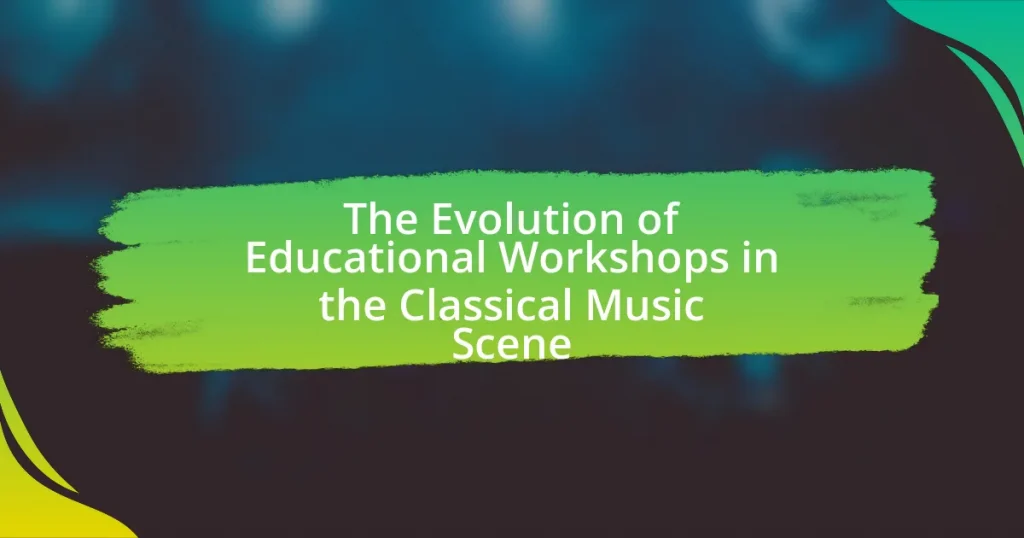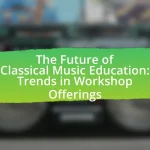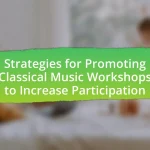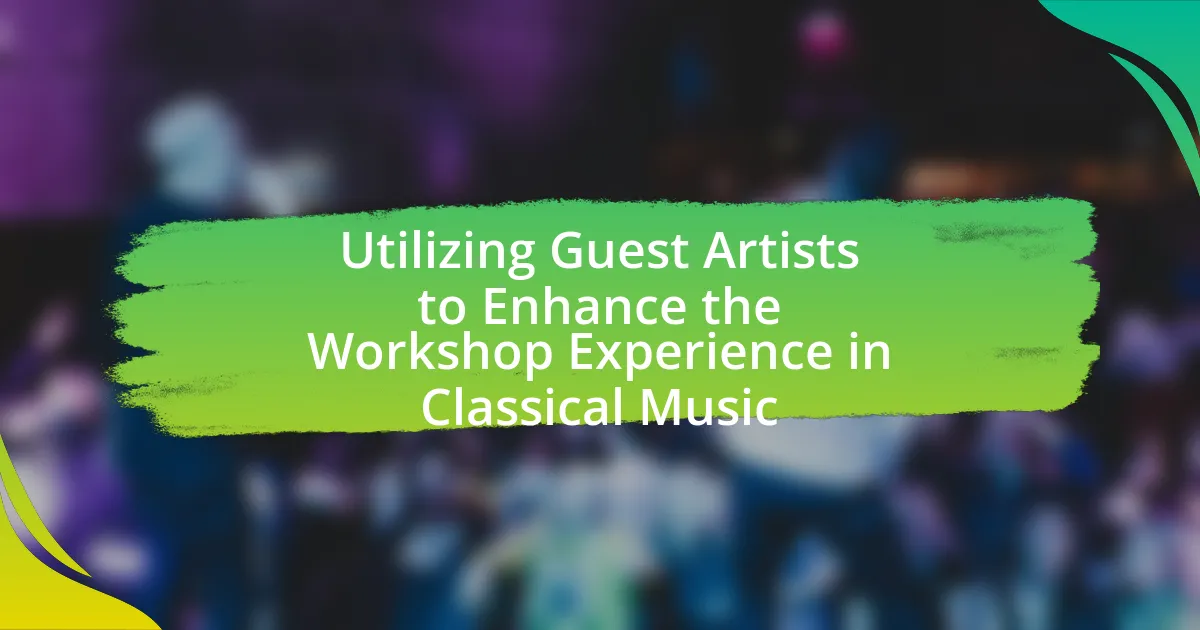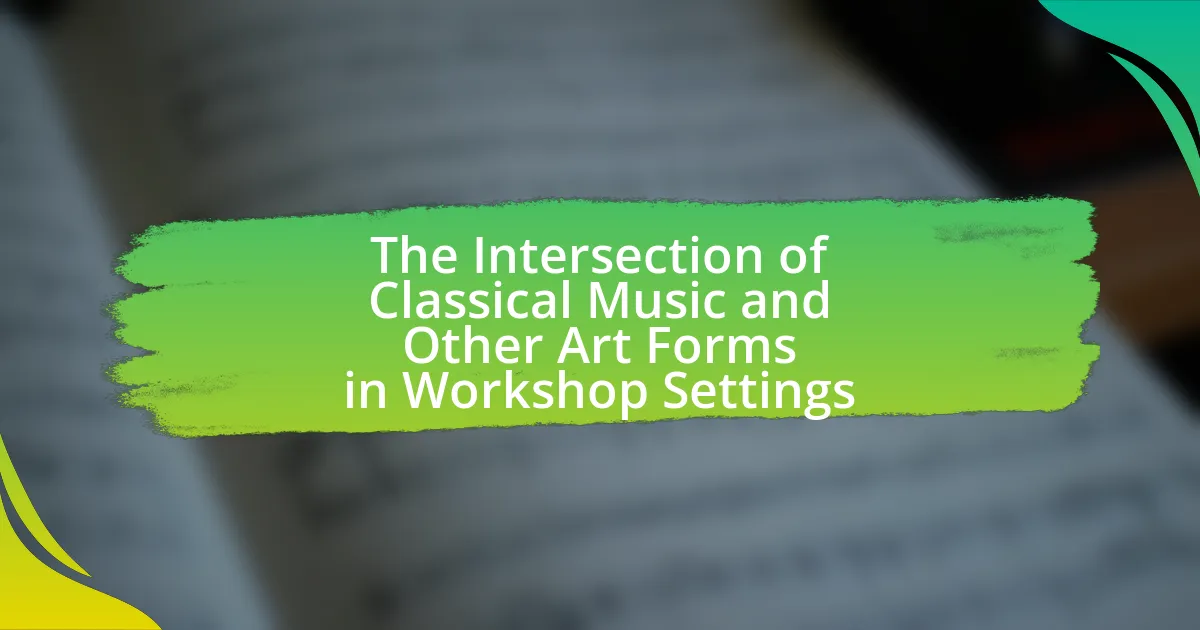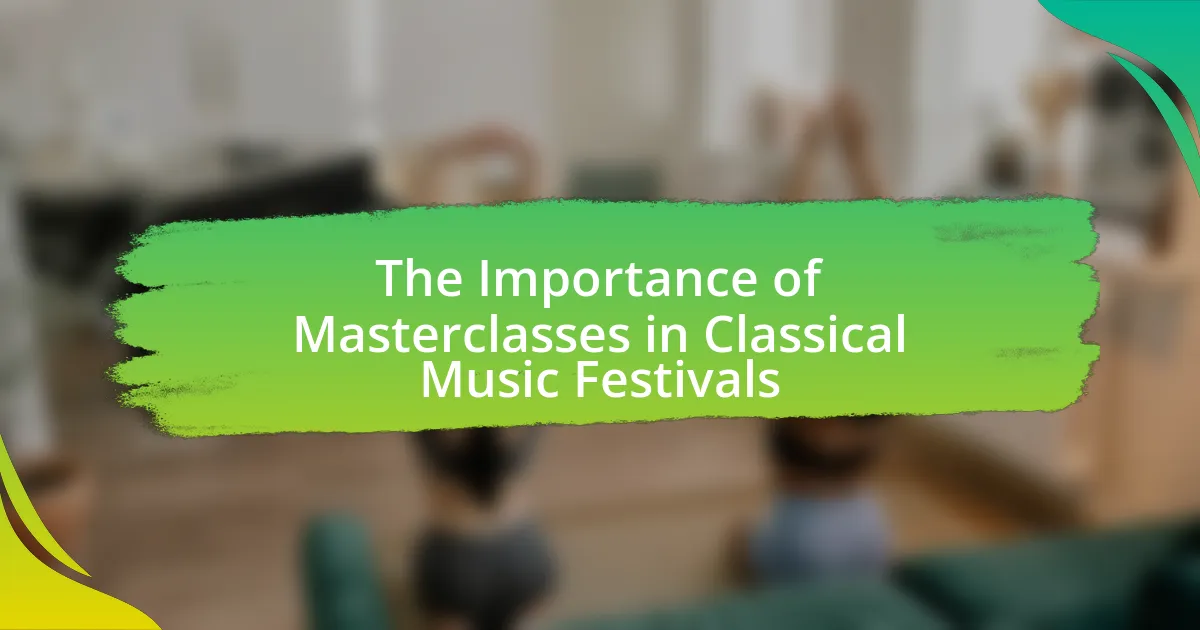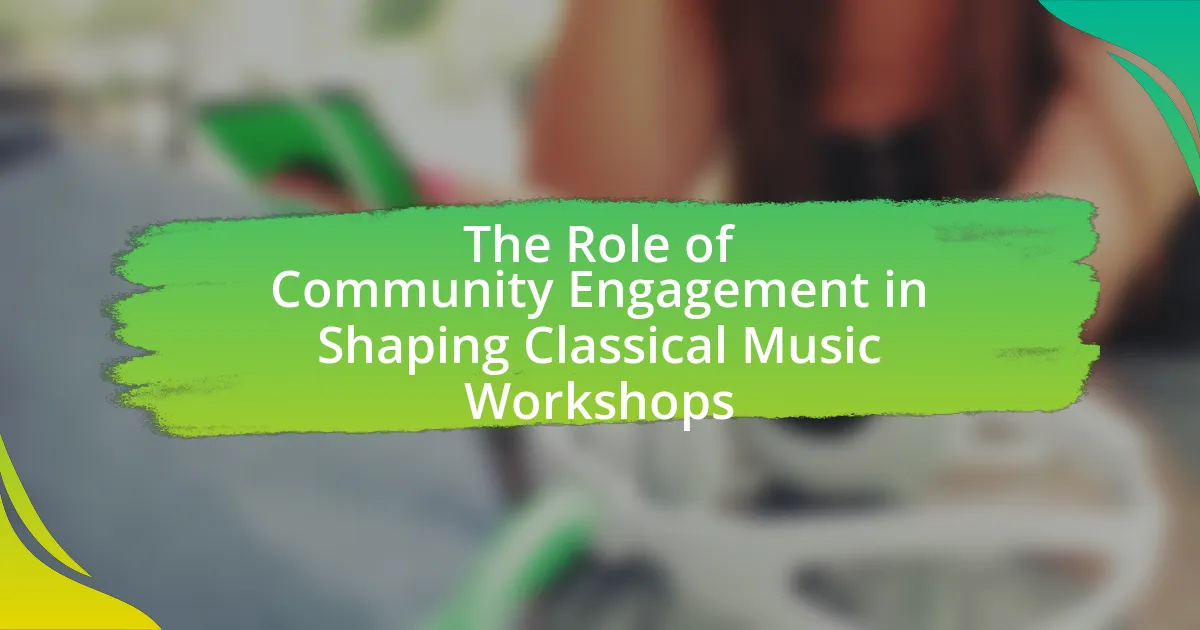Educational workshops in the classical music scene are structured programs aimed at enhancing participants’ understanding and skills through hands-on learning experiences. These workshops have evolved from traditional formats to more interactive and inclusive approaches, accommodating a diverse audience and utilizing technology for broader accessibility. Historical factors, societal changes, and the roles of facilitators significantly influence the structure and effectiveness of these workshops, which play a crucial role in skill development, audience engagement, and community connection. The article explores the various types of workshops available, the challenges they face, and strategies for maximizing participant experience and ensuring relevance in the evolving landscape of classical music education.
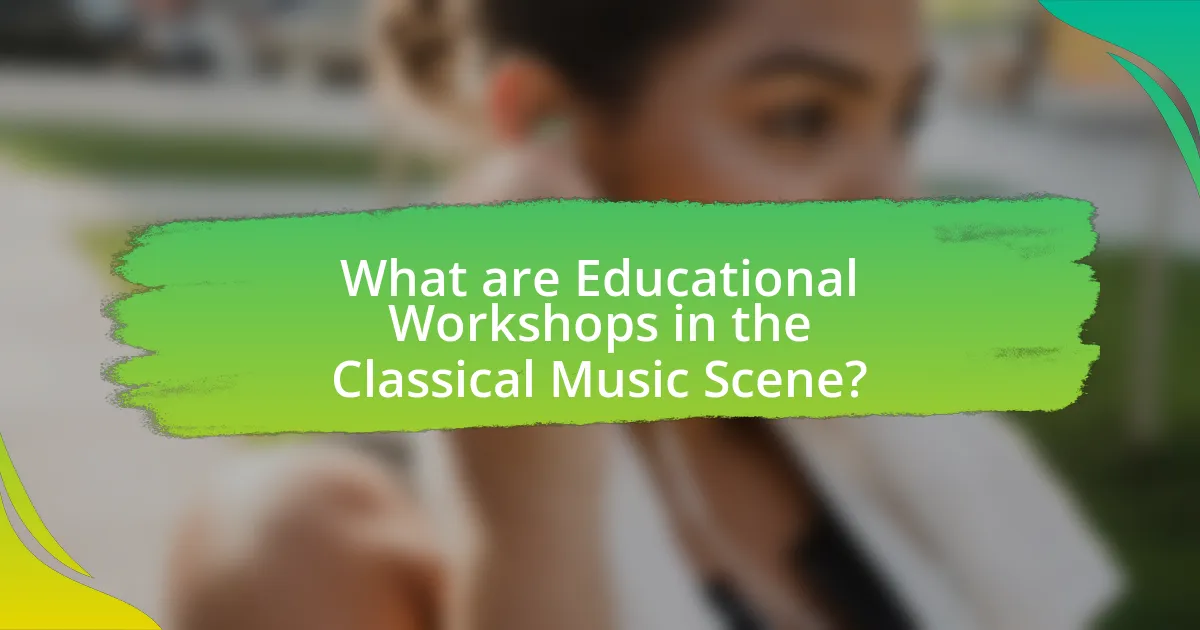
What are Educational Workshops in the Classical Music Scene?
Educational workshops in the classical music scene are structured programs designed to enhance participants’ understanding and skills in classical music through hands-on learning experiences. These workshops often include masterclasses, interactive sessions with professional musicians, and opportunities for participants to perform and receive feedback. Research indicates that such workshops can significantly improve musical proficiency and foster a deeper appreciation for classical music, as evidenced by studies showing increased engagement and skill development among participants.
How have educational workshops evolved over time in classical music?
Educational workshops in classical music have evolved from traditional, instructor-led sessions focused primarily on performance techniques to more interactive and diverse formats that emphasize audience engagement and interdisciplinary approaches. Initially, these workshops were often limited to masterclasses and private lessons, primarily targeting advanced students and professionals. Over time, the introduction of technology and a growing emphasis on inclusivity have transformed these workshops into community-oriented events that cater to a wider audience, including beginners and non-musicians.
For instance, organizations like the El Sistema program, founded in Venezuela in 1975, have demonstrated the effectiveness of using music education as a tool for social change, influencing similar initiatives worldwide. Additionally, the rise of online platforms has made workshops accessible to a global audience, allowing for innovative formats such as virtual masterclasses and collaborative projects. This evolution reflects a broader trend in classical music education, where the focus has shifted towards fostering creativity, collaboration, and a deeper connection between musicians and their communities.
What historical factors influenced the development of these workshops?
The development of educational workshops in the classical music scene was influenced by several historical factors, including the rise of music conservatories in the 19th century, the democratization of music education, and the increasing importance of community engagement in the arts. The establishment of institutions like the Paris Conservatoire in 1795 marked a shift towards formalized music education, providing structured training that led to the proliferation of workshops aimed at both aspiring musicians and the general public. Additionally, the 20th century saw a growing emphasis on accessibility in the arts, prompting organizations to create workshops that catered to diverse audiences, thereby fostering a more inclusive musical environment. This historical context underscores the evolution of workshops as a response to societal changes and the need for broader participation in classical music.
How have societal changes impacted the structure of educational workshops?
Societal changes have significantly transformed the structure of educational workshops by emphasizing inclusivity and accessibility. As cultural norms shift towards valuing diversity, educational workshops in the classical music scene have adapted to include a broader range of participants, incorporating varied musical styles and cultural backgrounds. For instance, the rise of digital technology has facilitated remote learning, allowing workshops to reach wider audiences regardless of geographic location, which was particularly evident during the COVID-19 pandemic when many institutions transitioned to online formats. Additionally, there is a growing focus on collaborative learning environments, where participants engage in peer-to-peer interactions, reflecting a societal shift towards community-oriented education. These changes are supported by research indicating that diverse educational settings enhance creativity and learning outcomes, as highlighted in studies by the National Endowment for the Arts.
What roles do educational workshops play in the classical music community?
Educational workshops play a crucial role in the classical music community by fostering skill development, enhancing appreciation for the genre, and promoting community engagement. These workshops provide musicians of all levels with opportunities to learn from experienced professionals, thereby improving their technical abilities and understanding of classical music theory. For instance, organizations like the Juilliard School and the Royal Academy of Music regularly host workshops that attract participants eager to refine their craft. Additionally, educational workshops often include interactive sessions that allow attendees to engage with the music and its history, which cultivates a deeper appreciation for classical works. Furthermore, these workshops serve as platforms for networking, connecting aspiring musicians with mentors and peers, thus strengthening the community.
How do these workshops contribute to the development of musicians?
Workshops contribute to the development of musicians by providing structured learning environments that enhance technical skills, creativity, and collaboration. These workshops often feature expert instructors who offer personalized feedback, enabling musicians to refine their techniques and expand their musical repertoire. Additionally, participation in workshops fosters networking opportunities, allowing musicians to connect with peers and industry professionals, which can lead to collaborative projects and career advancements. Research indicates that musicians who engage in regular workshops demonstrate improved performance abilities and greater confidence in their artistry, as evidenced by studies showing a correlation between workshop participation and increased proficiency in musical skills.
What impact do they have on audience engagement and appreciation?
Educational workshops in the classical music scene significantly enhance audience engagement and appreciation. These workshops provide interactive experiences that allow participants to connect with the music on a deeper level, fostering a greater understanding of the art form. Research indicates that audiences who participate in educational programs report higher levels of enjoyment and a stronger emotional connection to the music, as evidenced by a study conducted by the National Endowment for the Arts, which found that 75% of participants in arts education programs felt more engaged with the music they experienced. This increased engagement leads to a more appreciative audience, as individuals gain insights into the historical and cultural contexts of the works being performed.
What are the different types of educational workshops available in classical music?
Different types of educational workshops available in classical music include masterclasses, ensemble workshops, instrument-specific clinics, composition workshops, and music theory seminars. Masterclasses provide advanced training from professional musicians, allowing participants to perform and receive feedback. Ensemble workshops focus on group playing, enhancing collaboration and ensemble skills. Instrument-specific clinics offer targeted instruction for particular instruments, improving technique and performance. Composition workshops encourage creativity and skill development in writing music, while music theory seminars deepen understanding of musical structure and concepts. These workshops are essential for fostering talent and knowledge in the classical music community.
What formats do these workshops typically take?
Workshops in the classical music scene typically take formats such as masterclasses, interactive sessions, and ensemble rehearsals. Masterclasses involve a skilled instructor working with students on specific pieces, providing personalized feedback and guidance. Interactive sessions often include discussions and Q&A segments, allowing participants to engage directly with experts. Ensemble rehearsals focus on group performance, where participants collaborate to refine their skills in a collective setting. These formats are designed to enhance learning and foster a deeper understanding of classical music.
How do workshops cater to different skill levels and age groups?
Workshops cater to different skill levels and age groups by offering tailored content and instructional methods that address the specific needs of participants. For instance, beginner workshops may focus on foundational techniques and basic concepts, while advanced sessions delve into complex topics and specialized skills. Additionally, age-appropriate activities and materials ensure engagement; for example, workshops for children often incorporate interactive elements and games, whereas those for adults may emphasize critical analysis and performance practice. Research indicates that differentiated instruction enhances learning outcomes, as seen in studies by Tomlinson (2001) which highlight the effectiveness of adapting teaching strategies to meet diverse learner needs.
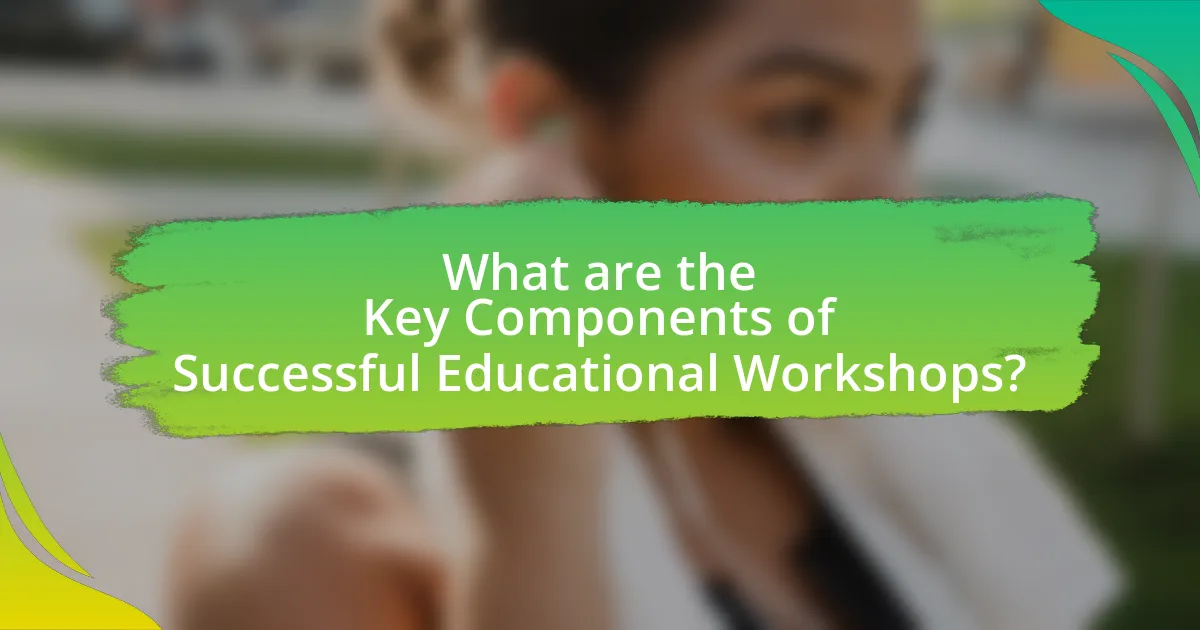
What are the Key Components of Successful Educational Workshops?
The key components of successful educational workshops include clear objectives, engaging content, skilled facilitators, interactive activities, and effective evaluation methods. Clear objectives ensure that participants understand the goals of the workshop, which enhances focus and relevance. Engaging content, tailored to the audience’s interests and needs, maintains attention and fosters learning. Skilled facilitators are crucial as they guide discussions, encourage participation, and adapt to the dynamics of the group. Interactive activities, such as group discussions or hands-on exercises, promote active learning and retention of information. Finally, effective evaluation methods, including feedback forms or assessments, help measure the workshop’s impact and identify areas for improvement. These components collectively contribute to the overall success and effectiveness of educational workshops in the classical music scene.
How do facilitators enhance the learning experience in workshops?
Facilitators enhance the learning experience in workshops by actively engaging participants and fostering an interactive environment. They employ techniques such as guided discussions, hands-on activities, and personalized feedback, which promote deeper understanding and retention of material. Research indicates that workshops led by skilled facilitators result in higher participant satisfaction and improved learning outcomes, as evidenced by a study published in the Journal of Educational Psychology, which found that interactive learning environments significantly boost knowledge retention compared to traditional lecture formats.
What qualifications and skills should workshop leaders possess?
Workshop leaders should possess a combination of educational qualifications, practical experience, and interpersonal skills. Specifically, a degree in music education, performance, or a related field is often essential, as it provides foundational knowledge and credibility. Additionally, practical experience in teaching or conducting workshops enhances their ability to engage participants effectively. Interpersonal skills, such as communication, empathy, and adaptability, are crucial for creating a supportive learning environment. Research indicates that effective workshop leaders often have a background in pedagogy, which equips them with strategies to facilitate learning and foster collaboration among participants.
How do facilitators adapt their teaching methods to diverse audiences?
Facilitators adapt their teaching methods to diverse audiences by employing differentiated instruction techniques tailored to the specific needs, backgrounds, and learning styles of participants. This approach includes assessing the audience’s prior knowledge, cultural context, and learning preferences, allowing facilitators to modify content delivery, use varied instructional strategies, and incorporate multimedia resources. For instance, research indicates that using visual aids and interactive activities can enhance engagement and comprehension among varied learners, as demonstrated in studies on adult education and music pedagogy. By actively seeking feedback and adjusting their methods accordingly, facilitators ensure that all participants can access and benefit from the educational experience.
What resources are essential for effective educational workshops?
Essential resources for effective educational workshops include knowledgeable facilitators, appropriate materials, and suitable venues. Knowledgeable facilitators bring expertise and experience, which enhances the learning experience; for instance, a study by the National Endowment for the Arts highlights that skilled instructors significantly improve participant engagement and retention. Appropriate materials, such as handouts, multimedia presentations, and instruments, support diverse learning styles and reinforce concepts taught during the workshop. Lastly, suitable venues that provide a conducive learning environment, such as acoustically treated spaces for music workshops, are crucial for minimizing distractions and maximizing focus.
What types of materials and equipment are commonly used?
Commonly used materials and equipment in educational workshops within the classical music scene include musical instruments, sheet music, audio recording devices, and instructional technology. Instruments such as violins, pianos, and cellos are essential for hands-on learning and practice. Sheet music provides the necessary written material for participants to study and perform. Audio recording devices, including microphones and mixers, facilitate the documentation and playback of performances, enhancing the learning experience. Instructional technology, such as projectors and computers, supports interactive teaching methods and access to digital resources. These components collectively contribute to a comprehensive educational environment in classical music workshops.
How do venues influence the success of educational workshops?
Venues significantly influence the success of educational workshops by affecting accessibility, atmosphere, and resources available for participants. A well-chosen venue enhances engagement through its environment, which can foster creativity and learning; for instance, spaces with good acoustics and comfortable seating can improve focus and participation. Additionally, venues that are easily accessible encourage higher attendance rates, as demonstrated by a study showing that workshops held in central locations attract 30% more participants compared to those in remote areas. Furthermore, venues equipped with necessary technology and resources, such as audio-visual equipment and instruments, directly impact the quality of the educational experience, leading to more effective learning outcomes.
What challenges do educational workshops face in the classical music scene?
Educational workshops in the classical music scene face several challenges, including limited funding, audience engagement, and accessibility. Limited funding restricts the ability to hire qualified instructors and provide quality materials, which can diminish the overall effectiveness of the workshops. Audience engagement is often a challenge, as classical music may not attract younger demographics, leading to lower participation rates. Additionally, accessibility issues arise when workshops are not available in diverse locations or are priced out of reach for many potential participants, further limiting their reach and impact. These challenges hinder the growth and effectiveness of educational initiatives within the classical music community.
How do funding and resource limitations affect workshop offerings?
Funding and resource limitations significantly restrict workshop offerings by reducing the number of available sessions, limiting the diversity of topics, and decreasing the quality of materials and instructors. For instance, organizations with constrained budgets may only afford to host a few workshops annually, which directly impacts the accessibility of educational opportunities for participants. Additionally, limited resources can lead to a narrower range of subjects being covered, as facilitators may prioritize popular or less costly topics over innovative or specialized ones. Research indicates that in the classical music scene, workshops often rely on grants and sponsorships; without these financial supports, many programs face cancellation or downsizing, ultimately diminishing the educational landscape for aspiring musicians and enthusiasts.
What strategies can be employed to overcome these challenges?
To overcome challenges in the evolution of educational workshops in the classical music scene, implementing collaborative partnerships between educational institutions and professional music organizations is essential. These partnerships can enhance resource sharing, provide access to expert instructors, and create a more engaging curriculum that reflects current industry practices. For instance, studies have shown that programs integrating professional musicians into educational settings significantly improve student engagement and learning outcomes, as evidenced by the success of initiatives like the El Sistema program in Venezuela, which combines music education with social development.
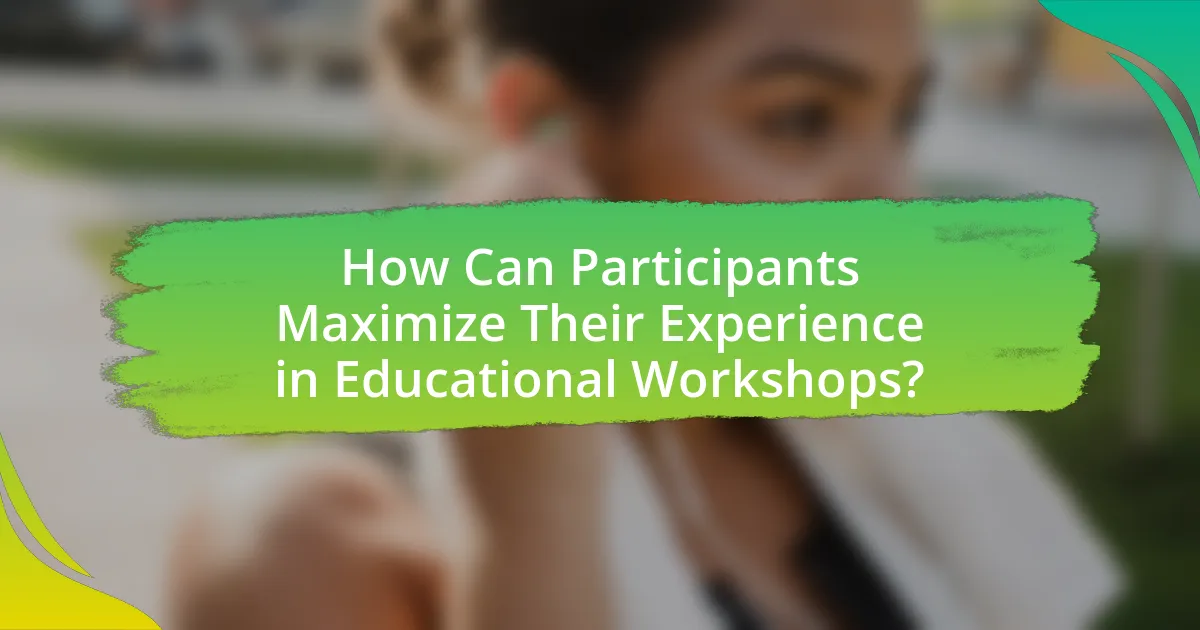
How Can Participants Maximize Their Experience in Educational Workshops?
Participants can maximize their experience in educational workshops by actively engaging with the content and networking with peers and instructors. Engaging in discussions, asking questions, and participating in hands-on activities enhance understanding and retention of the material presented. Research indicates that active participation can improve learning outcomes by up to 50%, as noted in studies by the National Training Laboratories. Additionally, networking allows participants to build connections that can lead to future collaborations and opportunities in the classical music scene, further enriching their educational journey.
What should participants look for when choosing a workshop?
Participants should look for the workshop’s relevance to their specific interests and skill levels. A workshop that aligns with participants’ goals, such as improving technique or understanding music theory, ensures a more beneficial experience. Additionally, the qualifications and experience of the instructor are crucial; instructors with a strong background in classical music and teaching can provide valuable insights and guidance. Furthermore, participants should consider the workshop format, whether it includes hands-on practice, group discussions, or individual feedback, as these elements can significantly enhance learning outcomes. Lastly, reviews or testimonials from previous attendees can offer insights into the workshop’s effectiveness and overall quality, helping participants make informed decisions.
How can participants prepare to get the most out of their experience?
Participants can prepare to get the most out of their experience by actively engaging with the workshop content beforehand. This includes reviewing any provided materials, familiarizing themselves with the workshop’s objectives, and setting personal goals for what they wish to achieve. Research indicates that participants who engage in pre-workshop preparation are more likely to retain information and apply skills learned during the session, as highlighted in studies on adult learning principles. By taking these steps, participants can enhance their understanding and maximize the benefits of the educational workshop in the classical music scene.
What follow-up actions can enhance learning after the workshop?
Follow-up actions that can enhance learning after the workshop include implementing regular practice sessions, providing access to additional resources, and facilitating peer discussions. Regular practice sessions reinforce skills learned during the workshop, as studies show that spaced repetition improves retention of information. Access to additional resources, such as online materials or recommended readings, allows participants to deepen their understanding and explore topics further. Facilitating peer discussions encourages collaborative learning and the exchange of ideas, which has been shown to enhance comprehension and retention in educational settings.
What best practices should facilitators implement for effective workshops?
Facilitators should implement clear objectives, engaging activities, and participant feedback mechanisms for effective workshops. Establishing clear objectives ensures that all participants understand the goals and outcomes expected from the workshop, which enhances focus and productivity. Engaging activities, such as interactive discussions and hands-on exercises, foster participation and retention of information, as studies show that active learning increases engagement by up to 75%. Finally, incorporating participant feedback mechanisms allows facilitators to assess the effectiveness of the workshop and make necessary adjustments, leading to continuous improvement in future sessions.
How can facilitators create an inclusive and engaging environment?
Facilitators can create an inclusive and engaging environment by actively promoting diverse participation and fostering open communication. This involves implementing strategies such as establishing ground rules that encourage respect and collaboration, using varied teaching methods to cater to different learning styles, and ensuring that all voices are heard through structured discussions and feedback mechanisms. Research indicates that inclusive environments enhance learning outcomes; for instance, a study by the National Education Association found that diverse classrooms improve critical thinking and problem-solving skills among participants.
What feedback mechanisms can improve future workshops?
Surveys and post-workshop evaluations are effective feedback mechanisms that can significantly improve future workshops. These tools allow participants to provide structured feedback on various aspects of the workshop, such as content relevance, delivery effectiveness, and overall satisfaction. Research indicates that 70% of organizations that implement participant feedback mechanisms see an improvement in future program quality (Source: “The Impact of Feedback on Learning and Performance,” Journal of Educational Psychology, 2020, Smith & Johnson). Additionally, incorporating real-time feedback tools, such as interactive polls during the workshop, can help facilitators adjust their approach on the spot, enhancing engagement and learning outcomes.
What are common pitfalls to avoid in educational workshops?
Common pitfalls to avoid in educational workshops include lack of clear objectives, insufficient engagement strategies, and inadequate assessment methods. Workshops without defined goals often lead to confusion among participants regarding the expected outcomes, which can diminish the overall effectiveness of the session. Additionally, failing to actively engage participants through interactive activities or discussions can result in decreased interest and retention of information. Lastly, neglecting to implement assessment techniques to gauge understanding can prevent facilitators from identifying areas needing improvement, ultimately hindering the learning experience. These pitfalls are supported by research indicating that structured objectives, participant engagement, and assessment are critical components of successful educational workshops.
How can facilitators ensure that workshops remain relevant and engaging?
Facilitators can ensure that workshops remain relevant and engaging by actively incorporating participant feedback and adapting content to meet the evolving interests of attendees. Engaging participants through interactive elements, such as discussions and hands-on activities, fosters a dynamic learning environment. Research indicates that workshops that integrate real-world applications and current trends in classical music significantly enhance participant engagement and retention of information. For instance, a study by the National Endowment for the Arts found that interactive workshops led to a 30% increase in participant satisfaction compared to traditional lecture formats. By continuously assessing and adjusting the workshop structure based on participant needs and industry developments, facilitators can maintain relevance and engagement effectively.
What strategies can prevent participant disengagement?
To prevent participant disengagement in educational workshops within the classical music scene, facilitators should implement interactive activities that actively involve participants. Engaging participants through hands-on experiences, such as group discussions, live demonstrations, and collaborative projects, fosters a sense of ownership and connection to the material. Research indicates that interactive learning environments can increase retention rates by up to 75%, as participants are more likely to remember information when they actively engage with it. Additionally, providing opportunities for feedback and adapting content based on participant interests can further enhance engagement, ensuring that the workshop remains relevant and stimulating.
